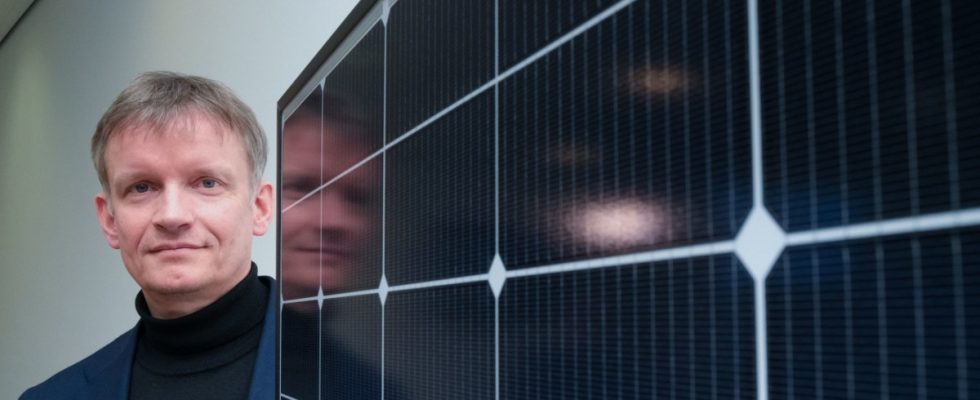The clock is now ticking in Freiberg. There are still two or three weeks until the last solar modules will be manufactured here in Saxony. On Friday, the Swiss company Meyer Burger made its next steps public. The factory, which employs around 500 people, could finally come to an end in April. Could – because the company, Germany’s largest solar manufacturer, is still speculating on a reaction from Berlin. After all, you are a victim of “unfair competitive conditions that only politics can remedy.” That’s what Meyer Burger boss Gunter Erfurt says in a hastily called meeting.
Actually, politicians should have started fixing it these days. The coalition factions have been negotiating improvements to the so-called solar package for weeks. In addition to simplifications, for example for private solar systems, the federal government also wants to throw out a lifebuoy for the domestic solar industry. She complains about a massive oversupply of Chinese solar modules that are piling up in Europe’s North Sea ports. This has caused prices for solar systems to fall to a level where modules made in Europe can no longer keep up. Federal Economics Minister Robert Habeck (Greens) also demands that if the market is not to be left entirely to Chinese companies, a solution must be found quickly.
There is already an idea for this: a “resilience” surcharge could be granted on the funding, which is awarded directly for smaller systems and through tenders for larger ones. Anyone who installs modules from Germany or Europe on the roof or in the solar park should also benefit from higher funding. “What is driving companies out of the country is an unfair market,” says Erfurt. “The resilience system will be able to heal this.”
But the traffic light coalition has not yet been able to agree on this. The solar package was actually supposed to pass the Bundestag this week, but the parliamentary groups were unable to agree on it. The FDP also wants to keep the solar industry in the country, but some of the new instrument goes too far for them. The Greens and SPD, on the other hand, are pushing for an agreement. So one fruitless conversation follows another. In mid-January, Meyer Burger announced that the Freiberg factory would be closed if the Bundestag did not pass a resolution “in the second half of February”, i.e. in the last week of the session.
The Bundestag next meets in mid-March, and coincidentally the company is now demanding clarity by mid-March. Because shortly afterwards the general meeting will be held. It is intended to clear the way for a capital increase of up to 260 million euros, which in turn should pave the company’s way into the “highly attractive US market”. Plants in Colorado and Arizona are to be completed with the fresh capital, and there is also the prospect of a generous tax credit Inflation Reduction Act, with which the USA lures companies from all over the world.
Saxony’s Prime Minister finds it “unbearable” that the local industry is in trouble despite the solar boom
500 jobs will be lost in Freiberg while they are being created in the USA, and only government help can avert this – a message like this couldn’t be made more striking. Erfurt even, without being asked, rejects any suspicion that this is an attempt at blackmail. Such are the realities. “Today is not a good day for Europe, for Freiberg,” says the Meyer Burger boss.
The message does not fail to have an impact. “It must be possible to keep manufacturers in Germany and Europe,” says SPD energy politician Nina Scheer. After all, it’s also about jobs and know-how. The coalition must now find an answer quickly. Saxony’s Prime Minister Michael Kretschmer (CDU) finds it “unbearable” that the local industry is in such distress despite the solar boom. “The federal government must now come to an agreement on the saving resilience bonus.”
Meyer Burger has already applied for short-time work for the Freiberg plant until the summer. If production there doesn’t close, that would be the bridging measure. After all, a factory like this isn’t a CD player where you just press start or stop, says Erfurt.

